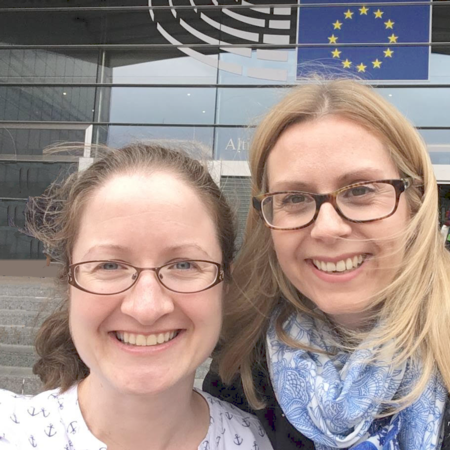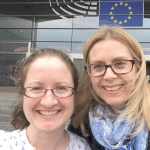 The HMSA has been out and about quite a bit this month, last week attending the “Optimising Patient Relevant Outcome Measures for sustainable healthcare systems and strong economies” meeting at the European Parliament.
The HMSA has been out and about quite a bit this month, last week attending the “Optimising Patient Relevant Outcome Measures for sustainable healthcare systems and strong economies” meeting at the European Parliament.
On Wednesday 20 June, Hannah Ensor (HMSA trustee) and Lisa Renaut (HMSA volunteer) visited the European Parliament for this important meeting of the Brain Mind Pain interest group (thanks to Pain Alliance Europe for funding travel expenses.) The talks were both informative and interesting.
Cathalijne van Doorne, from Euro Ataxia, spoke about the practical importance of clinical research and interventions focusing on what would most benefit the patient – which is a big shift from what the clinical priorities might be. The example she gave was of focusing treatments on improving distance walked when the main problem for the individual is actually the ability to talk and communicate. I could really relate to this – being able to prepare food was a far higher priority for me than walking, but clinicians always seemed to focus on getting me to walk! So it was great to see this highlighted at such a high-profile event that helps inform policy.
Laure Delbecque, from Pharmerit International, expanded on this need to move from just ‘patient-centred outcomes’ to actual ‘patient-prioritised outcomes’. This was something that Christopher Bidad (Pfizer) also picked up on, and by the end of the day, he had changed his references of ‘patient-centred outcomes’ to ‘patient-prioritised outcomes’.
Research is now under way to create validated measures for the treatment outcomes that patients consider a high priority. It’s a huge piece of research but will in the long term make getting appropriate treatment much easier for hypermobile people. It’s a long way down the line still, but it’s exciting to see that the process is under way.
Another newly completed piece of research, undertaken by Pain Alliance Europe, was on the effect of pain. Many of the results won’t be a surprise, but a validated, European-wide research survey will actually really help the HMSA to decide how best to help address the issues we all face.
Some preliminary results:
- 51% patients had to leave work
- 44% had a drop in income
- 66% got no help to stay in work on get back in to work
This data is very useful to have: research-based evidence, not just ‘we know it because we’ve lived it’ testimony.
Hannah Ensor commented: “Although it was hard work and used up a lot of brain power, this event was well worth the effort: raising the profile of the HMSA and hypermobility syndromes; building useful links with other organisations; and learning things that will help the HMSA improve.”

